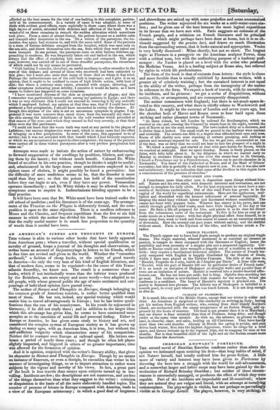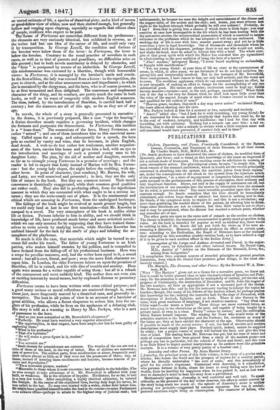SHERIDAN KNOWLES'S FORTESCUE.
THE second novel of Sheridan Knowles confirms rather than alters the opinion we intimated upon noticing his first—that long habits of mind, if not Nature herself, had totally unfitted him for prose fiction. A little more of variety and interest may have been given to Fortescue by throwing the hero into a struggle with the world for self-advancement, and a somewhat larger and loftier scope may have been gained by the in- troduction of Richard Brinsley Sheridan ; bat neither of these circum- stances is successfully managed, or produces the effect of which they were capable. Part of the incidents are improbable and ill-contrived; where they are natural they are vulgar and literal, with an attempt at tumefying commonplace. The playwright is visible, but not perhaps so pervadingly visible as in George Lovell. The player, however, is very striking, in an unreal estimate of life, a species of theatrical piety, and a kind of tavern or good-fellow view of ethics, now and then shrewd enough, but generally hollow and verging upon claptrap, especially as regards that odious class of people, creditors who expect to be paid. The forms of Fortescue are somewhat different from its predecessor : the elements are very curiously identical, but exhibited in reverse, as if the writer had but one idea of the career of life, and could only vary it by transposition. In George Lovell, the condition and fortune of the heroine were below those of the lover : in Fortesoue, the lover is below the heroine. Contrary to the usual practice of novelists in such cases, as well as to that of parents and guardians, no difficulties arise on this ground ; but in both novels matrimony is delayed by obstacles, and the "finis " is postponed by means of an abduction. In George Lovell, this misdemeanour was executed by a libertine, though with honourable views: in Fortescue, it is managed by the heroine's uncle and cousin. In the first edition, the lady was rescued from a house : in the repetition, she goes to church, and at the altar announces cause and impediment ; in which she is sustained by the clergyman, and the hero, who is of course present, to be at first tormented and then delighted. The coarseness and unpleasant character of the thing, and its conduct, are pretty much the same in both books, as well as its want of congruity with modern English manners. The time, indeed, by the introduction of Sheridan, is carried back half a century; but the manners are all of this age, so far as they are of any
age.
In novels, the whole of a story is generally presented in narrative :
in the drama, it is previously prepared, like a case "ripe for hearing." A fiction therefore mostly requires a governing incident, which changes the fortunes and postpones the denouement. In Fortescue, this incident is a " bean-feast." The connexions of the hero, Henry Fortescue, are rather " mixed"; and one of them introduces him to this convivial meet- ing. Called upon for a song, and subsequently for a speech, the hero gets so excited by vanity and wine, that he becomes, in plain English, dead drunk. A well-to-do but rather low tradesman, another acquaint- ance of the hero, carries him home and gives him a bed, with an eye to the introduction and marriage of such a genteel young man to his daughter Letty. The plan, by the aid of mother and daughter, succeeds so far as to entangle young Fortescue in a promise of marriage ; and the reader is led to expect that Letty instead of Marian will be Mrs. Fortes- cue : but the young lady elopes, the night before the wedding, with an- other lover. In point of character, (not conduct,) Mr. Barton, his wife, and Letty, are well conceived and presented; in fact, they are the only bits of nature in the book. But they are common nature. Their moral coarseness is theatrically exaggerated, while their common good qualities are rather sunk. They also fail in producing effect, from the injudicious manner in which they are connected with what ought to be a serious in- terest ; they are the serio-comic out of place. It is the sentimental and ethical which are amusing in Fortescue, from the undesigned burlesque.
The failings of the book might be evolved at much greater length, but we could only land at last in our first conclusion—that Mr. Knowles is unequal to a novel. The very atmosphere of his book is unlike either life or fiction. Persons inferior to him in ability, and we should think in knowledge of life, have produced much better and more artistical novels : which we can only account for by supposing that they have trained them- selves to write novels by studying novels, while Sheridan Knowles has unfitted himself for the task by the study of plays and inhaling the at- mosphere of the playhouse. So much is this the case, that materials which might be turned to ac- count fail under his touch. The father of young Fortescue is an Irish patriot, who makes himself enemies by his politics, and is compelled to leave Ireland from the falling-off of his professional business. Here was a scope for peculiar manners, and, had the writer been equal to it, a sound moral : but all is curt, literal, and poor; even the mere Irish character es- capes him. In London, the elder Fortescue loiters on upon the promises of Sheridan, till he is ruined, and his wife dies of trouble and anxiety. Here again were means for a writer capable of using them : but all is a rehash of the commonest and most unlikely kind. The author does not even aim
at exciting interest by moral means, but by cupboard distress or pecuniary difficulties.
Fortescue seems to have been written with some ethical purpose; and a.good many serious or moral reflections are scattered through it, some- tunes just, more frequently marred by a theatrical cant, and generally in- terruptive. The best in all points of view is an account of a barrister of great abilities, who allows a fluent eloquence to seduce him into the ne- glect of his profession, while he lives on the applauses of a debating club. His story is told as a warning to Henry by Mrs. Parkyn, who is a sort
of patroness to the hero.
" And so you were astonished at Mr. Brownfield's eloquence?" "Perfectly. He must have received a very superior education?"
"His opportunities, in that respect, have been ample; nor has he been guilty of neglecting them."
"What is his profession?" "That of a barrister."
" He will make a great figure in it, madam." "Never!"
"You astonish me!"
"Such themes for astonishment are common. The wrecks of the sea are not a tithe of those of the land, in the way of talent. Men of abilities are numerous; men of power few. The noblest parts, from misdirection or abuse, frequently avail their owners almost as little as if they were not the possessors of them; nay, at tunes, instead of insuring them emoluments and honours, become sources of po- verty and degradation!"
"'Tis a miserable picture, madam."
"Miserable to those whom it most concerns; but profitable to the beholder, if he be wise enough to take advantage of it. Mr. Brownfield is afflicted with your fault, or weakness. He is the creature of impulse. His history, for so far, is told in a very few words. After completing a highly classical education, he entered the Temple. In the course of the stipulated time, having duly kept his terms, he was called to the bar. No man ever started with a wider, richer field before him. He might have qualified himself to take the lead in the courts—to enter Parliament —to achieve office—perhaps to attain to the highest step of judicial rank; but unfortunately, he became too soon the delight and astonishment of the dinner and the supper-table, of the society and the club; and, hence, you were witness last night to the highest triumph which probably he will ever achieve ! Probably, do I say ? Even that is giving him a chance of which there is little hope: you may conceive at once how incompatible is the life which he has been leading with the dry and severe studies, the nnintermitted prosecution of which is essential to assure eminence in the profession which he has adopted—I will not say embraced. The working-day of life is over with him; seasons passed away; and yet he is little more than a tyro in legal knowledge. Out of thousands and thousands whom he has electrified with his eloquence, perhaps there is not me who would not smile, and shake his head, were he asked to intrust him with a brief. The whole ener- gies of that great spirit with which his Maker has endowed him are squandered in administering to the poor ambition of being the hero of a tavern!" "Alas! madam," interposed Henry, "I never beard anything so melancholy, so fraught with mortification !" " Yes, my young friend: at your time of life we stare at the consequences of errors, in which, in after years, we are fortunate if we do not find ourselves im- perceptibly and irretrievably involved. But in the instance of Mr. Brownfield, those consequences, I have reason to fear, are only half arrived; and the worst are to come. The worthless applanses, which he can command without an effort, he is now incapable of making an effort to forego for the accomplishing of any one substantial good. His means are slender; excitement must be kept up; habits become masters—tyrants—and, in the end, perhaps, executioners! What think you if the day is not very far distant when we shall look upon little more than the rains of the augnst temple of mind which the Creator erected in that man, and qualified for the noblest of uses?"
"Heaven grant, madam, that such a day may never arrive!" exclaimed Henry, the tears almost starting into his eyes. Mrs. Parkyn looked at him for a moment or two, earnestly and tenderly.
" Amen!" added she; "but I look for it with trembling, my young friend: Tor' I am interested for him—as indeed everybody that knows him must be, for he is the soul of mcdesty, integrity, and kindliness: but I look for that day with trembling, yet with certainty. Nothing but a miracle can save him: a sad re- flection, that it should take a miracle to obviate what a little common sense and self-command would have prevented, if exerted duly and in time!"



























 Previous page
Previous page